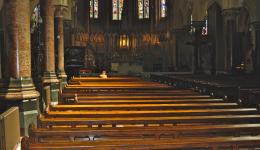Category:
The Church is a self-correcting Body, continually changing, continually needing to change; continually reforming, continually needing to be reformed. Every so often, however, a group in the Body arises, convinced that there is too much of something or not enough of something – that something is missing; that something (or Some One) needs to be added.
The correction is made, usually over some period of time – sometimes very quickly, always painfully, for those who need reforming don’t like to be told so; and those who see the need to reform are, frankly, sometimes ‘jerks.’ But sometimes they are loving, lovely, well-meaning people, albeit persistent (can you spell ‘obnoxious’ or just ‘determined’?) who champion the new correction that often becomes a new Movement, for they have rightly discerned and expressed concern, and the correction needed for some aspect that needs to be brought to the attention of the whole, the wider body. However, they are not usually welcomed, listened to, wanted; prophets seldom are. The parting is usually painful.
The new groups become heretical sects because, though their initial reason and perspective, input and correction has been (and may still be needed albeit unwanted) to instruct, correct, re-direct the Body. In themselves or left to themselves they will become, in themselves, a (new) heresy, with attending heresies created as necessarily intended for the self-protection, preservation and perseverance of the group. It is ironic that the corrective becomes the next heresy. Every solution needs to be solved.
The new movement becomes heretical because its major focus, and necessarily or at least understandably so, is on the corrective itself: on that doctrine, that initiative, that missing thesis or praxis that is believed so necessary for the health of the whole body. In concentrating on that piece (why it is necessary and what the fruit if accepted or curse if rejected), however, focus is lost on the wider health, concerns, theology and praxes of the whole. The new emphasis that has been sought had been seen as a way of bringing new life, balance and so-on to the Body as the whole, but usually, sooner or later, the proponents have been made to separate from the Body, as schismatics, by themselves or by the Body. The Church becomes sub-divided into many sects. The Body has need of them and they need the Body, but the push and separation on both sides is greater than the pull to remain or move towards reunion when separation occurs.
A Body can live without a hand but not vice-versa. Ultimately, the heresy will die – or, at least, one would think such a plight inevitable for the new group or movement. Usually, however this does not happen, for neither the Body nor the new group remains ‘pure’ in itself. The Body begins to gradually adopt the corrective suggested, in ways it now thinks fit, and with timing that limits too many jarring effects. It can do this more easily now that the strident proponents have left or been expelled. So, for every reformation there is a counter-reformation by the mother body.
Catholics in history have simply(?) adapted and adopted through new ‘Orders’ that brought significant renewal, health and new focus directions. In the Protestant ‘movement,’ I think that Luther had no idea what he was starting when he made himself and his interpretation of Scripture the norm and the means for ongoing discernment of ‘God’s true Word.’ Scripture may be authoratative and inspired (I think it is) but that doesn't mean our interpretations are. Instead of the Church saying what the Scriptures said and meant, Luther said what the Scriptures said and meant; the Reformers joined him in this approach. They may have been right to do so (do we have to say that they were right in doing so?).
Cannot one protest and seek reformation without leaving, without being expelled? Can we incorporate diversity in the midst of unity without having to submit to some unattainable uniformity? Isn’t it a scandal that there are thousands and thousands and thousands of Protestant denominations, all with their unique and nuanced views of Scriptural interpretation, their 'take' on the truth, teaching, interpretations, perspectives (all with attending praxes) – all claiming to be right, inspired, closer to God’s ways and truth, and so on?! Catholics must just shake their head in bewilderment or sheer amusement, scorn or pity at this continuing protest-phenomenon which is even celebrated by the Reformers cliche: Ecclesia semper reformanda est which is Latin for “the church is always to be reformed”. I think that is a true statement; I don’t think it means we have to always split to do it or see it done.
What God allows does not equate with what God likes.
But for us, like it or not, each new movement as with the whole Body will adapt and incorporate into its own life and practice what the other has, with more or less lasting effect and greater or less so health-giving effect. The Body will survive until a new heresy is needed(?) or at least arises to correct it; the old heresy will only survive for a while in its original state and ‘purity’ and manage to continue only if it takes into itself all that the Body has, offers and gives as necessary for full health and the group’s flourishing. Most sects do eventually take in the wider aspects of Body-life. Some denominations are virtually inextinguishable after only a few years; some are still fighting the church decades or centuries later that they left and are unaware that it may have become very much like their own and vice versa.
It would be better if the sects, like smaller life-boats let down for a while, in dangerous times and treacherous seas, would come back to the main ship and climb on board once more — and this time in a more gentle, loving, patient, humble – but no less persistent way), seeking, praying and working to guard the health, peace and unity of the whole Body.
Would the Body let them? Would the sects desire to join again, even if they could?
‘That they may be one . . . ‘ Jesus still prays.









